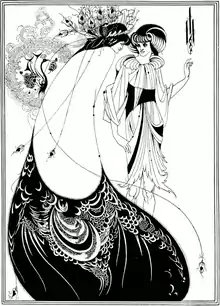Fin de siècle
Fin de siècle means turn of the century in French. It is widely used for the time around 1900, but also for the closing of an old era, and the start of a new one.


Fin de siècle is sometimes used to mean the type of art, culture and way of behaving at the end of the nineteenth century. This age was felt to be a period of degeneration, and sometimes simultaneously a time of hope for a new beginning.[1]
The "spirit" of fin de siècle often refers to the cultural hallmarks that were recognized as prominent in the 1880s and 1890s, including 'pessimism', and a widespread belief that civilization leads to decadence.
The themes of fin de siècle political culture were very controversial and have been cited as a major influence on fascism.[2][3] The major political theme of the era was that of revolt against materialism, rationalism, positivism, bourgeois society and liberal democracy.[2]
Examples in literature
Reference
- Schaffer, Talia. 2008. Literature and culture at the fin de siècle. New York: Longman, 3.
- Sternhell, Zeev. 1998. Crisis of fin-de-siècle thought. In International Fascism: theories, causes and the new consensus. London and New York, 169.
- Payne, Stanley G. A history of fascism, 1914-1945. Oxon, England, UK: Routledge, (1995, 2005): 23-24.